
There are some food needed by our body every morning. The 7 breakfast foods your body needs every morning. Certainly! A nutritious breakfast is essential to kickstart your day with energy and provide your body with essential nutrients. Here are seven breakfast foods that can benefit your health:
Eggs

- Eggs are a simple and nutritious choice. They are rich in protein, which supports muscle growth and maintenance.
- In a study, people who had eggs for breakfast reported feeling less hungry and consumed fewer calories at lunch.
- Eggs also contain antioxidants, choline (important for brain and liver health), B vitamins, and essential minerals.
- Contrary to previous beliefs, eggs do not significantly raise cholesterol levels in most people and may even have a protective effect against heart disease.
Functions and Nutrients of Eggs
You can’t think think of breakfast foods your body needs without thinking about eggs. Certainly! Eggs are a versatile and nutritious food that has been consumed by humans for thousands of years. That why they are part of the 7 breakfast food you need for your body every morning. Let’s dive into their health benefits and nutritional content:
- Strong Muscles:
- The protein in eggs helps maintain and repair body tissues, including muscles.
- It’s an excellent source of high-quality protein, containing all the essential amino acids needed for muscle growth and maintenance.
- Brain Health:
- Eggs contain vitamins and minerals essential for brain function and the nervous system.
- Choline, found in eggs, plays a crucial role in memory and cognitive function.
- Energy Production:
- Eggs provide all the necessary nutrients for energy production.
- B vitamins, iron, and phosphorus contribute to overall vitality.
- Healthy Immune System:
- Vitamins A, B-12, and selenium in eggs support immune health.
- A strong immune system helps protect against infections and illnesses.
- Heart Health:
- Choline helps break down homocysteine, an amino acid associated with heart disease risk.
- Contrary to past concerns, moderate egg consumption does not significantly impact cholesterol levels in most people.
- Pregnancy Support:
- Eggs are rich in folic acid (folate), which is crucial for preventing congenital disabilities like spina bifida during pregnancy.
- Eye Health:
- Lutein and zeaxanthin in eggs help prevent macular degeneration, a leading cause of age-related blindness.
- Other vitamins in eggs also promote good vision.
- Weight Management:
- The protein in eggs keeps you full, reducing snacking and overall calorie intake.
- Skin Health:
- Certain vitamins and minerals in eggs promote healthy skin and prevent tissue breakdown.
Nutritional Content (per medium boiled or poached egg, weighing 44 g):
- Energy: 62.5 calories
- Protein: 5.5 g
- Total fat: 4.2 g (1.4 g saturated)
- Sodium: 189 mg
- Calcium: 24.6 mg
- Iron: 0.8 mg
- Magnesium: 5.3 mg
- Phosphorus: 86.7 mg
- Potassium: 60.3 mg
- Zinc: 0.6 mg
- Cholesterol: 162 mg
- Selenium: 13.4 mcg
- Lutein and zeaxanthin: 220 mcg
- Folate: 15.4 mcg
Incorporate eggs into your balanced diet for their numerous health benefits! 🥚🌟
Greek Yogurt
Certainly! Greek yogurt is a thick, creamy dairy product that offers several health benefits. That why they are part of the 7 breakfast food you need for your body every morning. Let dive into the Health benefit and its nutritional content:

- Improving Bone Health:
- Greek yogurt is rich in calcium and protein.
- Calcium supports bone health and reduces the risk of osteoporosis, a degenerative bone disease.
- Adequate protein intake is essential for maintaining strong bones.
- Reducing Appetite and Hunger:
- The high protein content in Greek yogurt helps people feel fuller for longer.
- Research suggests that a protein-rich meal leads to reduced calorie intake throughout the day, contributing to weight loss.
- Boosting Metabolism:
- A high-protein diet may increase the number of calories burned daily.
- Including protein in every meal, along with fibrous carbohydrates and healthy fats, can aid weight loss and boost metabolism.
- Improving Gut Health:
- Greek yogurt contains probiotics, which are beneficial bacteria that support gut health.
- However, recent research shows that individual responses to probiotics vary.
- Encouraging Good Mental Health:
- Consuming probiotic yogurt, including Greek yogurt, may positively impact mental well-being.
- Nutrient Content (per 100 grams of plain Greek yogurt):
- Protein: Approximately 10 grams.
- Calcium: Essential for bone health.
- Iodine: Supports thyroid function.
- Vitamin B-12: Important for energy production.
- Low Sugar: Strained Greek yogurt has less sugar than regular yogurt.
Remember to choose plain Greek yogurt without added sugars for maximum health benefits. Enjoy it as part of a balanced diet! 🥣🇬🇷
Coffee
Coffee, a beverage brewed from roasted coffee beans, has a rich history and a stimulating effect on humans due to its caffeine content. That why they are part of the 7 breakfast food you need for your body every morning. Let’s delve into the details:

- Origin and History:
- Coffee’s earliest credible evidence as a modern beverage dates back to 15th-century Yemen in southern Arabia. It was first roasted and brewed in a manner similar to how it is prepared today. The Yemenis procured coffee seeds from the Ethiopian Highlands via coastal Somali intermediaries and cultivated them in Yemen.
- By the 16th century, coffee had spread to the rest of the Middle East and North Africa, eventually reaching Europe.
- The two most commonly grown coffee bean types are C. arabica and C. robusta.
- Coffee plants thrive in over 70 countries, primarily in equatorial regions across the Americas, Southeast Asia, the Indian subcontinent, and Africa.
- As of 2023, Brazil leads coffee production, contributing 35% of the world’s total output.
- Brewing Process:
- Coffee beans are separated from the fruits of the Coffea plant to produce unroasted green coffee beans.
- These beans are then roasted and ground into fine particles, which are steeped in hot water and filtered to create a cup of coffee.
- Coffee can be prepared and presented in various ways, including espresso, French press, caffè latte, or even ready-to-drink canned coffee.
- Additions like sugar, sugar substitutes, milk, and cream are often used to mask the bitter taste or enhance the flavor.
- Health Benefits:
- While coffee is known for its stimulating effect, it also offers several health benefits:
- Reduced Risk of Type 2 Diabetes: Regular coffee consumption may lower the risk of developing type 2 diabetes.
- Support for Weight Management: Some studies suggest that coffee can aid in weight management.
- Potential Antidepressant Effects: Moderate coffee intake has been associated with a reduced risk of depression.
- Heart Health: Coffee contains antioxidants and may contribute to heart health.
- Social and Economic Impact: Coffeehouses have played a significant role in culture and social interactions throughout history.
- While coffee is known for its stimulating effect, it also offers several health benefits:
- Trivia:
- The word “coffee” entered the English language in 1582, borrowed from the Dutch “koffie,” which came from Ottoman Turkish “kahve” and ultimately from Arabic “qahwah.”
- Medieval Arab lexicographers believed that “qahwah” meant “wine” due to its dark color, but it most likely referred to the brew or the bean itself
Oatmeal
Oatmeal, a comforting and nutritious breakfast staple, is made from oats that have been de-husked, steamed, and flattened. That why they are part of the 7 breakfast food you need for your body every morning. Let’s explore its benefits and versatility
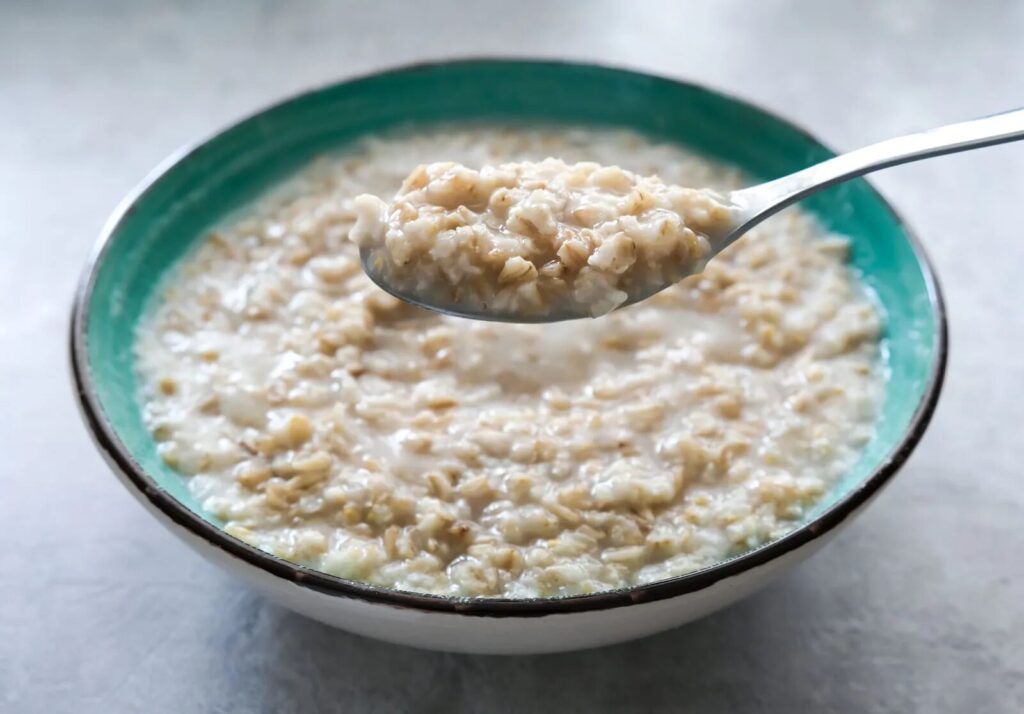
- Nutritional Richness:
- Oats are a whole grain known scientifically as Avena sativa. They offer a well-balanced nutrient profile:
- Carbs and Fiber: Oats are rich in carbs and fiber, including the special fiber called beta-glucan.
- Protein: They provide high-quality protein with a good balance of essential amino acids.
- Vitamins and Minerals: Oats contain manganese, phosphorus, magnesium, copper, iron, zinc, folate, vitamin B1 (thiamin), and vitamin B5 (pantothenic acid).
- A cup of prepared oatmeal (made from half a cup of dry oats with water) includes approximately:
- 27.4 grams of carbs
- 5.3 grams of protein
- 2.6 grams of fat
- 4 grams of fiber
- 153.5 calories
- Oats are a whole grain known scientifically as Avena sativa. They offer a well-balanced nutrient profile:
- Antioxidants and Avenanthramides:
- Oats are rich in antioxidants and beneficial plant compounds, including avenanthramides.
- Avenanthramides have several health benefits:
- Blood Pressure Regulation: They may help lower blood pressure by increasing nitric oxide production, which widens blood vessels.
- Anti-Inflammatory and Anti-Itching Effects: Avenanthramides contribute to overall well-being.
- Health Benefits:
- Weight Loss: Oats can aid weight management due to their fiber content.
- Heart Health: Regular oat consumption may reduce the risk of heart disease.
- Skin Health: Antioxidants in oats benefit skin health.
- Constipation Relief: Oats’ soluble fiber promotes regular bowel movements.
- Blood Sugar Control: Oats help stabilize blood sugar levels.
- Varieties of Oatmeal:
- Rolled Oats: These are flattened oats, commonly used for oatmeal.
- Steel-Cut Oats: Also known as coarse oatmeal or Irish oatmeal, they have a chewy texture.
- Instant Oats: Processed for quick cooking, but may be mushy.
- Ground Oats (White Oats): Used in various recipes.
Chia Seeds
Think about breakfast foods your body needs, think about Chia seeds, those tiny black or white seeds from the Salvia hispanica L. plant, pack a powerful nutritional punch. That why they are part of the 7 breakfast food you need for your body every morning. Let’s explore their health benefits:

- Highly Nutritious:
- Despite their small size, chia seeds are incredibly nutritious.
- Just 1 ounce (28 grams) or approximately 2 tablespoons of chia seeds contain:
- Calories: 138
- Protein: 4.7 g
- Fat: 8.7 g
- Alpha-linolenic acid (ALA): 5 g (an essential omega-3 fatty acid)
- Carbs: 11.9 g
- Fiber: 9.8 g
- Calcium: 14% of the Daily Value (DV)
- Iron: 12% of the DV
- Magnesium: 23% of the DV
- Phosphorus: 20% of the DV
- Zinc: 12% of the DV
- Vitamin B1 (thiamine): 15% of the DV
- Vitamin B3 (niacin): 16% of the DV.
- Antioxidant Powerhouse:
- Chia seeds are rich in antioxidants, including chlorogenic acid, caffeic acid, myricetin, quercetin, and kaempferol.
- These antioxidants protect sensitive fats in chia seeds from going rancid and benefit human health by neutralizing harmful molecules called free radicals.
- Free radicals contribute to aging and diseases like cancer.
- Specific benefits include:
- Lowering blood pressure (chlorogenic acid)
- Anti-inflammatory effects (caffeic acid).
- Health Benefits:
- Heart Health: Antioxidants in chia seeds support heart health and liver function.
- Blood Sugar Management: Chia seeds may help stabilize blood sugar levels.
- Bone Health: Their calcium content contributes to strong bones.
- Weight Loss: High fiber content aids weight management.
- Digestive Health: Chia seeds improve digestive function.
- Preventing Chronic Diseases: Regular consumption may prevent chronic diseases.
- Versatility:
- Chia seeds can be used in various recipes.
- Try making chia pudding by mixing them with liquid to embrace their gel-like consistence
Berries
Certainly! Berries come in a delightful array of colors, flavors, and nutritional benefits. Let’s explore some popular types of berries:
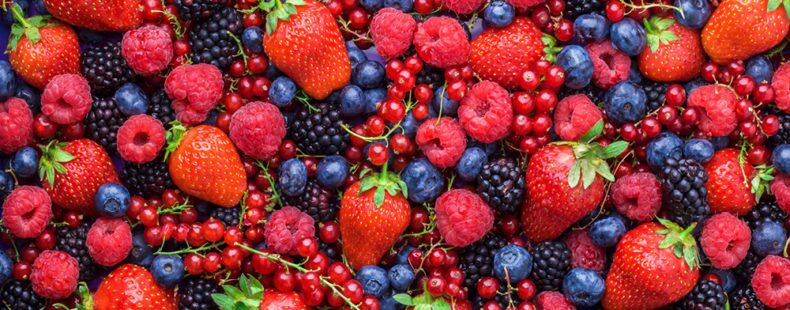
- Cranberries:
- These sour red berries grow on vines near ground level in bogs.
- Rich in vitamin C, fiber, and antioxidants.
- Commonly used to make juice, jams, and dried berries.
- Cranberry juice is known for its mild antibacterial effect, which may help prevent urinary tract infections.
- Blueberries:
- Juicy, sweet, and packed with vitamins and antioxidants.
- Anthocyanins (the pigment giving them color) promote good eye health.
- Low in fat, high in fiber, and beneficial for cardiovascular health by lowering cholesterol.
- Huckleberries:
- Resemble blueberries but have a distinct flavor.
- Rich in vitamins and antioxidants.
- Found in North America and often used in pies, jams, and desserts.
- Bilberries:
- Similar to blueberries but smaller and darker.
- Known for improving night vision and supporting eye health.
- Common in Europe and used in various culinary creations.
- Raspberries:
- Not technically berries botanically, but we consider them as such culinarily.
- Red, black, or golden varieties.
- High in fiber, vitamins, and antioxidants.
- Great for snacking, baking, or adding to yogurt.
- Blackberries:
- Also not true botanical berries.
- Dark, juicy, and rich in vitamins and minerals.
- Support cardiovascular health and taste great fresh or in desserts.
- Goji Berries:
- Exotic and praised for health benefits.
- High in antioxidants, vitamins, and minerals.
- Used in traditional Chinese medicine.
- Acai Berries:
- Dark purple and popular in smoothie bowls.
- Loaded with antioxidants and healthy fats.
- Originating from the Amazon rainforest.
Health Benefits
Certainly! Berries are not only delicious but also incredibly nutritious. That why they are part of the 7 breakfast food you need for your body every morning. Here are some compelling reasons we included them into breakfast foods your body needs and why you need to include them in your diet:
- Loaded with Antioxidants:
- Berries contain powerful antioxidants like anthocyanins, ellagic acid, and resveratrol.
- These compounds help control free radicals, which can otherwise damage your cells and cause oxidative stress.
- Blueberries, blackberries, and raspberries have some of the highest antioxidant activity among commonly consumed fruits.
- Blood Sugar and Insulin Response:
- Berries may improve blood sugar levels and insulin sensitivity.
- Studies suggest that they protect cells from high blood sugar levels and reduce insulin response after high-carb meals.
- Even healthy individuals benefit from including berries in their diet1.
- Rich in Fiber:
- Berries are a great source of soluble fiber.
- Soluble fiber slows down food movement through your digestive tract, leading to reduced hunger and increased feelings of fullness.
- It can also decrease the number of calories absorbed from mixed meals, aiding weight management.
- Heart Health and Cholesterol:
- Berries support heart health by reducing oxidative stress and inflammation.
- They may also lower cholesterol levels, contributing to overall cardiovascular well-being.
- Skin Health and Aging:
- Antioxidants in berries benefit skin health and may slow down the aging process.
- Regular consumption can promote a healthy complexion.
- Cognitive Function:
- Some studies suggest that berries enhance cognitive health and may help prevent age-related decline.
- Their antioxidants protect brain cells from damage.
- Lowering Blood Pressure:
- Consuming berries may help maintain healthy blood pressure levels.
- Their bioactive compounds contribute to better vascular function.
- Cancer Prevention:
- While more research is needed, some evidence suggests that berries’ antioxidants may play a role in preventing certain cancers.
You May Also Like…
- HOW TO MAKE DELICIOUS AKARA: A STEP-BY-STEP GUIDE
- Nutrition And Lifestyle Modifications for Sustainable Weight Management
- Unlocking Gut Health: A Journey through Nutrient-Rich Foods
- Nutrient-Rich Foods for Promoting Weight Management
- Your Global Passport to Food’s Most Mouthwatering Encounters
Irish Potatoes
Certainly! Irish potatoes have an interesting history and are not what you might expect, hence why they make it to our breakfast foods your body needs. Let’s dive into the details:
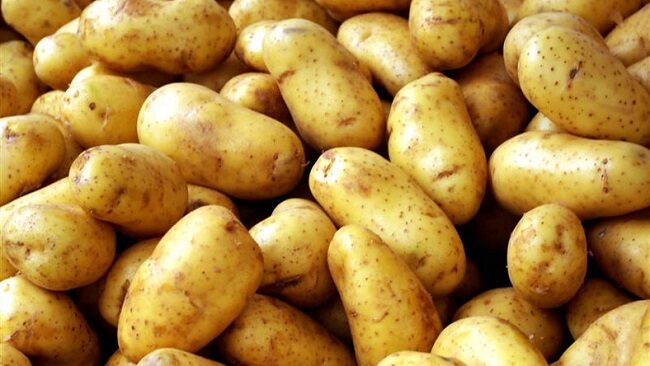
- Origin and Name:
- Contrary to their name, Irish potatoes are not native to Ireland.
- They actually come from the Solanum tuberosum plant, which is originally from South America.
- The term “Irish potato” is associated with the Irish potato famine, a devastating period caused by a mold infestation of the Irish potato crop.
- Appearance and Varieties:
- Irish potatoes are commonly known as white potatoes.
- Their flesh is creamy white, and they have a thin, white to cream-colored skin.
- Some may have mottled black flecks or marks on the skin.
- These potatoes are classified as waxy, meaning they hold their shape well when boiled or roasted.
- Culinary Uses:
- Irish potatoes are versatile and widely used:
- Boiling: They are ideal for boiling, as they maintain their shape.
- Roasting and Broiling: They can be roasted or broiled for a crispy texture.
- Potato Salads: Irish potatoes work well in salads.
- Fried Potatoes: They can be turned into crispy fries.
- Less Suitable for Mashed Potatoes: When mashed, they tend to become gluey and dense.
- Irish potatoes are versatile and widely used:
- Availability and Storage:
- Irish potatoes are abundant and available year-round in most markets.
- Look for specimens without soft spots or slimy areas.
- Some discoloration and contorted shapes are normal.
- Store them in cool, dry conditions to keep them fresh.
- Growing Your Own:
- You can grow Irish potatoes at home:
- Choose a well-drained soil patch in a temperate garden spot.
- Amend the soil with compost and mulch in early spring.
- Plant seed potatoes obtained from gardening supply stores.
- As the vines grow, the tubers underneath store energy for the parent plant, sprouting into new potatoes next year.
- You can grow Irish potatoes at home:
- Historical Significance:
- The turmoil caused by the Irish Potato Famine (1845-1849) contributed to cultural forces that led to Irish independence from the United Kingdom in the 20th century.
Remember, a balanced breakfast should include protein, fiber, and a variety of nutrients to keep you full and energized throughout the day. Choose nutrient-dense options and enjoy a great start to your mornings!
Conclusion
Remember, breakfast truly is the most important meal of the day. By incorporating these 7 breakfast foods your body needs into your routine, you’ll be setting yourself up for sustained energy, improved focus, and overall well-being. So, ditch the sugary cereals and processed pastries, and embrace the goodness of whole grains, fruits, proteins, and healthy fats. Your body will thank you for it, and you’ll experience the difference a nourishing breakfast can make!
Don’t forget to experiment and tailor your choices to your preferences and dietary needs. Remember, breakfast isn’t just about food; it’s about setting the tone for a healthy and productive day. So, grab your favorite ingredients, whip up a delicious and nutritious dish, and savor the energy and focus that these 7 breakfast foods your body needs will provide!
Frequently Asked Questions About Breakfast Foods Your Body Needs
1. What are some quick and easy options for these 7 breakfast foods?
- Whole grains: Choose whole-wheat toast with avocado, overnight oats with chia seeds, or a whole-wheat tortilla wrap with scrambled eggs and veggies.
- Fruits: Grab a handful of berries or a sliced apple with nut butter, blend a smoothie with spinach and banana, or top your yogurt with chopped fruit.
- Proteins: Opt for hard-boiled eggs, Greek yogurt with granola, a slice of smoked salmon on whole-wheat toast, or even leftover grilled chicken from dinner.
- Healthy fats: Include an avocado slice on your toast, drizzle your oatmeal with almond butter, sprinkle chia seeds on your yogurt, or enjoy a few nuts alongside your fruit.
- Dairy (optional): Choose plain Greek yogurt, low-fat cottage cheese, or a glass of milk (dairy or plant-based) if it fits your dietary needs.
2. I’m not a morning person – any tips for making breakfast easy?
- Prep ingredients in advance: Wash and chop fruits the night before, cook hard-boiled eggs on the weekend, or portion out oatmeal and toppings.
- Utilize overnight oats: Soak rolled oats in milk or yogurt with chia seeds and spices for a grab-and-go breakfast.
- Make breakfast ahead of time: Prepare breakfast burritos, frittatas, or smoothie packs to assemble quickly in the morning.
- Keep healthy snacks on hand: If time is truly tight, choose nuts, fruits, or yogurt as a quick and nutritious option.
3. Are there any alternatives to the listed foods if I have dietary restrictions?
Absolutely! If you have allergies, intolerances, or follow a specific diet, there are plenty of alternatives:
- Whole grains: Explore gluten-free options like quinoa flakes, buckwheat groats, or rice cakes.
- Fruits: Choose any fruits you enjoy and tolerate, or use unsweetened applesauce in recipes.
- Proteins: Opt for plant-based proteins like tofu scramble, lentil soup, or nut butters.
- Healthy fats: Use seeds like chia or pumpkin seeds, drizzle olive oil on your meals, or choose avocado alternatives like mashed sweet potato.
- Dairy (optional): Explore plant-based alternatives like fortified soy milk, almond milk, or coconut milk.
4. Can I still have breakfast even if I don’t have a lot of time to cook?
Definitely! Many healthy and delicious breakfast options require minimal cooking or preparation. Focus on fresh fruits, hard-boiled eggs, nuts, yogurt, or quick whole-wheat toast variations. Remember, even a small, healthy breakfast is better than skipping it altogether.
5. What are some benefits of eating these 7 breakfast foods your body needs?
Incorporating these foods into your breakfast routine can provide numerous benefits:
- Increased energy and focus: Whole grains, fruits, and proteins offer sustained energy throughout the morning.
- Improved digestion: Fiber-rich fruits, whole grains, and yogurt support healthy digestion.
- Enhanced nutrient intake: These foods provide essential vitamins, minerals, and antioxidants for overall health.
- Weight management: Feeling full from these nutritious options can help prevent unhealthy snacking throughout the day.
Remember, consistency is key! By making small changes and incorporating these “7 breakfast foods your body needs” into your routine, you’ll be on your way to enjoying a healthier and more energized start to your day!
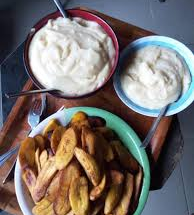
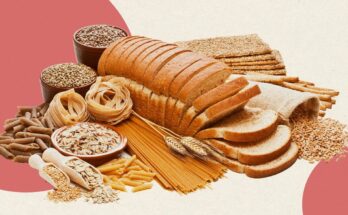

Thanks
What about lunch and dinner
brh it was all about breakfast 🥐 okay 👌
I love it 😍😍